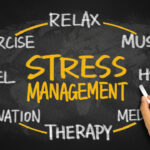As the demands of the modern workplace continue to increase, it is becoming more important than ever for professionals to prioritize their mental health and well-being. In this guide, we will share with you the top 5 stress management techniques that we have found to be most effective for professionals. By implementing these techniques, we believe that you can not only reduce your stress levels but also improve your overall productivity and quality of life. 1. Mindfulness Meditation: One of the most popular and effective stress management techniques is mindfulness meditation. This practice involves focusing your mind on the present moment and acknowledging your thoughts, feelings, and bodily sensations without judgment. By practicing mindfulness meditation, you can develop a better understanding of your stress triggers and learn to approach them with a calm and rational mindset. Studies have shown that regular mindfulness meditation can reduce stress, anxiety, and even improve sleep quality. 2. Exercise: Physical activity is not only essential for maintaining good physical health but also plays a significant role in managing stress. Regular exercise releases endorphins, which are chemicals that promote feelings of happiness and relaxation. It also helps to reduce the levels of stress hormones in the body, such as cortisol. Incorporating even just 30 minutes of exercise into your daily routine can have a significant impact on your stress levels and overall well-being. 3. Time Management: Managing time effectively is crucial for professionals who often have demanding work schedules. By developing a time management plan, you can prioritize tasks and avoid feeling overwhelmed by a never-ending to-do list. Set realistic goals and deadlines, and try to stick to them as much as possible. This will not only help reduce your stress levels but also ensure that you are completing tasks efficiently and effectively. 4. Social Support: Having a support system is essential for managing stress. Professionals often face heavy workloads and high-pressure environments, which can lead to feelings of isolation and burnout. By building a strong network of supportive colleagues, family, and friends, you can have someone to turn to when you need to vent, seek advice, or simply have a break from work. Social support has been shown to reduce stress, increase resilience, and even improve job satisfaction. 5. Self-Care: Last but not least, self-care is crucial for managing stress. It is essential to take care of your physical, emotional, and mental well-being. This includes getting enough sleep, eating a balanced and healthy diet, and taking breaks when needed. Many professionals neglect self-care in pursuit of career success, but it is vital to prioritize your own needs in order to be able to perform at your best. In conclusion, stress management is crucial for professionals to maintain a healthy work-life balance and achieve their goals.

